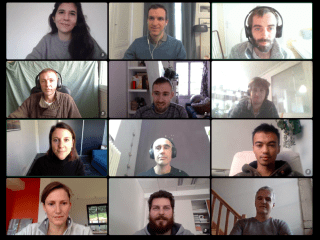The Cocoon Group
Members

Directeur de recherche
CNRS
Tel: 33 04 26 23 44 74

Chargé de recherche
CNRS
Tel: 04 72 43 29 09

Doctorant
UCBL
Doctorant
UCBL
Tel: 04 72 44 81 42

Directeur de recherche
INRIA
Tel: 33 04 26 23 44 74
Le Cocon is both a research team and a think tank.
Research in “Le Cocon” team focuses on two main topics: multiscale evolution on one hand (i.e., studying the evolution of genetic systems while considering different levels -nucleotides, transposable elements, genes, genomes, microbiomes, organisms, populations, species, geography-), and environmental issues on the other hand. In both cases, we rely on modeling and data analysis, using a combination of statistics and computer science.
Le Cocon is also a place to think about the responsibilities of research and researchers in the anthropocene era, and about the role of non-researcher citizens in orienting and conducting research.
Multiscale evolution
- We have a long history of working on gene transfers. We develop new methods to detect these events in complex systems involving more than two levels (host, symbiont and parasites for example) and
- We use horizontal transfer detection to date species trees and to infer yet unknown biodiversity (extinct and unsampled) (Sthoriz (ANR, 2018)) .
- We have a lasting interest into convergent genomic evolution (Convergenomics - ANR, 2015)
- We question the usual way of testing bioinformatic methods (Evoluthon - ANR, 2019)
- We study the interaction between human populations, their lifestyles, and their gut microbiota (Microregal - ANR, 2015). We are notably interested in identifying cases of host-microbe coevolution and in better understanding transmission dynamics.
Environmental issues
- We develop computational methods to support an agriculture that relies on ecosystemic relationships between crops, the soil, its microbiota, and wild plants and animals (Community Garden Book - Inria, 2019)
- We develop statistical approaches to understand and predict crop yield variability with respect to meteorological conditions
Research in the anthropocene
- We participate to the science shop (UdL), the ethics platform (UdL), Labo1.5, the open science committee, Sciences Citoyennes, the shift project
- We organize a series of seminars to help us think about the position of scientific research in the history of the anthropocene, and about the position of scientists in the future of the anthropocene.
- We assemble committees of citizens to investigate to what extent scientific research can be democratized.
Teaching and outreach
- We teach at University of Lyon, University Lyon 1, INSA, Inria, ENS Lyon, we organize bioinformatics internships
- We regularly participate in the Fête de la Science, have contributed videos in the public transportation system in Lyon, give conferences at Université Populaire and contribute articles in general public journals.
- We develop the software Lifemap to explore the tree of life on computers and smartphones.
Prospective students and postdocs are invited to apply, as we often welcome visitors for internships or research projects.
Publications
Display of 1 to 30 publications on 222 in total
Gene flow can reveal ghost lineages
Evolutionary Journal of the Linnean Society . 4 ( 1 ) : kzaf014
Journal article
see the publicationHGTs are not SPRs: In the presence of ghost lineages, series of Horizontal Gene Transfers do not result in series of Subtree Pruning and Regrafting
Molecular Biology and Evolution . 42 : 1-6
Journal article
see the publicationmultistrap: boosting phylogenetic analyses with structural information
Nature Communications . 16 ( 1 ) : 293
Journal article
see the publicationBiais et faux semblants dans les études co-phylogénétiques : problèmes ou opportunités ?
The Silene latifolia genome and its giant Y chromosome
Science . 387 ( 6734 ) : 630-636
Journal article
see the publicationAevol 4b: Bridging the gap between artificial life and bioinformatics
ALIFE 2024 - International Conference for Artificial Life . : 41-49
DOI: 10.1162/isal_a_00716
Conference paper
see the publicationProteome allocation and the evolution of metabolic cross-feeding
Evolution - International Journal of Organic Evolution .
Journal article
see the publicationResponse to “On the impact of incomplete taxon sampling on the relative timing of gene transfer events”
PLoS Biology . 22 ( 3 ) : e3002557
Journal article
see the publicationDual control of host actin polymerization by a Legionella effector pair
Cellular Microbiology .
DOI: 10.1155/2024/8896219
Journal article
see the publicationApproche globale des éthiques dans les relations sociétés/nature
: 211-219
Report
see the publicationEndoparasitoid lifestyle promotes endogenization and domestication of dsDNA viruses
eLife . 12 : e85993
DOI: 10.7554/eLife.85993
Journal article
see the publicationBack to the trees: Identifying plants with Human Intelligence
LIMITS 2023 - Ninth Workshop on Computing within Limits . : 1-11
Conference paper
see the publicationSe réapproprier la production de connaissance
Analyse Opinion Critique . : https://aoc.media/opinion/2023/05/17/se-reapproprier-la-production-de-connaissance/
Journal article
see the publicationPhylteR: Efficient Identification of Outlier Sequences in Phylogenomic Datasets
Molecular Biology and Evolution . 40 ( 11 ) : msad234
Journal article
see the publicationHost-symbiont-gene phylogenetic reconciliation
Peer Community Journal . : 1-22
Journal article
see the publicationThe crisis of the scientific mind : an investigation, a tragedy and a collective redistribution of roles
Les Cahiers de Framespa : e-Storia . ( 40 )
Journal article
see the publicationDiversity and evolution of pigment types in marine $Synechococcus$ cyanobacteria
Genome Biology and Evolution . 14 ( 4 ) : evac035
DOI: 10.1093/gbe/evac035
Journal article
see the publicationRelative Time Constraints Improve Molecular Dating
Systematic Biology . 71 ( 4 ) : 797-809
Journal article
see the publicationVers une représentation sonore des arbres phylogénétiques
16ème Congrès Français d'Acoustique, CFA2022 .
Conference paper
see the publicationtidy tree : A New Layout for Phylogenetic Trees
Molecular Biology and Evolution . 39 ( 10 ) : msac204
Journal article
see the publicationGhost lineages can invalidate or even reverse findings regarding gene flow
PLoS Biology . 20 ( 9 ) : e3001776
Journal article
see the publicationGOntact: using chromatin contacts to infer Gene Ontology enrichments for cis -regulatory elements
Preprint
see the publicationA hapless mathematical contribution to biology
History and Philosophy of the Life Sciences . 44 ( 34 )
Journal article
see the publicationThirdkind: displaying phylogenetic encounters beyond 2-level reconciliation
Bioinformatics . 38 ( 8 ) : 2350–2352
Journal article
see the publicationPhylogenetic reconciliation
PLoS Computational Biology . 18 ( 11 ) : e1010621
Journal article
see the publicationLong-range promoter–enhancer contacts are conserved during evolution and contribute to gene expression robustness
Genome Research . 32 ( 2 ) : 280-296
Journal article
see the publication
